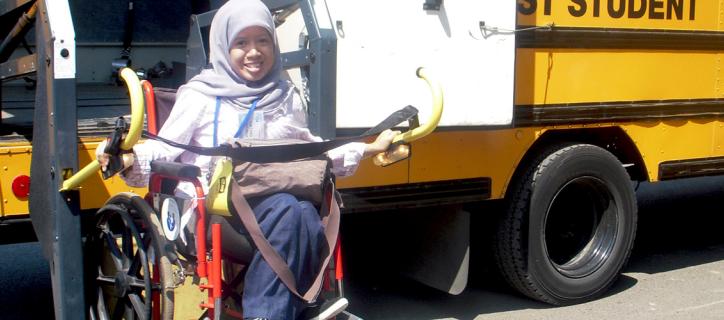High school exchange students typically stay for a few weeks up to an entire year in the U.S. before they return home. During the year, students learn more about American culture, share their culture with others, and gain leadership skills. Some exchange programs provide scholarships for traveling to the U.S. and placement with an American host family.
As a student with a disability, you will study at either:
- a mainstream high school with students who do not have disabilities OR
- a specialized school with students who have a similar disability as yours.
Who Provides Exchange Programs for High School Students?
The U.S. Department of State Bureau of Educational and Cultural Affairs (ECA) offers scholarship programs for high school students to study in the U.S. up to one year. Examples include the Future Leaders Exchange (FLEX), Youth Exchange and Study (YES), and Youth Ambassadors.
Other ECA programs bring high school-aged students to the U.S. for shorter periods of time. Instead of attending a high school, participants join activities for leadership training, skills building, or community service.
Many non-profit organizations provide high school study and cultural exchange experiences for international youth. Visit CSIET to search for organizations that provide opportunities for students from your country!
How Will I Apply if I Have a Disability?
You have the same right as young people without disabilities to apply to any youth exchange program. The selection process is different for each country and program. Many programs will require you to complete an application form, write an essay, or take an English language test. Contact MIUSA for information about taking an English language test with a disability.
If you apply for an exchange program, you may ask the organization for disability adaptations during the selection process if you need any. Examples are an application form that is accessible to someone who is blind, or a sign language interpreter during an interview for someone who is Deaf.
Who Can Help with Disability Preparations?
If you are accepted into an exchange program, your organization, host family, and host family will assist you with disability-related support and services if you need them. You can also contact MIUSA with your questions about living and studying in the U.S. with a disability.
© Mobility International USA 2025
All rights reserved.
Copying, reproducing, or reprinting of materials is prohibited without express written permission of MIUSA.
“American school is so neat,” signs Belvion, a Deaf exchange student from Mozambique who communicates using sign language. “They’ve got libraries and computers and the teachers are great. I’m loving it.”
Belvion is one of the many high school students with disabilities who come to the United States every year to live and study on an exchange program. Are you ready to be an exchange student too?
What Are Exchange Programs Like?
High school exchange students typically stay for a few weeks up to an entire year in the U.S. before they return home. During the year, students learn more about American culture, share their culture with others, and gain leadership skills. Some exchange programs provide scholarships for traveling to the U.S. and placement with an American host family.
As a student with a disability, you will study at either:
- a mainstream high school with students who do not have disabilities OR
- a specialized school with students who have a similar disability as yours.
Who Provides Exchange Programs for High School Students?
The U.S. Department of State Bureau of Educational and Cultural Affairs (ECA) offers scholarship programs for high school students to study in the U.S. up to one year. Examples include the Future Leaders Exchange (FLEX), Youth Exchange and Study (YES), and Youth Ambassadors.
Other ECA programs bring high school-aged students to the U.S. for shorter periods of time. Instead of attending a high school, participants join activities for leadership training, skills building, or community service.
Many non-profit organizations provide high school study and cultural exchange experiences for international youth. Visit CSIET to search for organizations that provide opportunities for students from your country!
How Will I Apply if I Have a Disability?
You have the same right as young people without disabilities to apply to any youth exchange program. The selection process is different for each country and program. Many programs will require you to complete an application form, write an essay, or take an English language test. Contact MIUSA for information about taking an English language test with a disability.
If you apply for an exchange program, you may ask the organization for disability adaptations during the selection process if you need any. Examples are an application form that is accessible to someone who is blind, or a sign language interpreter during an interview for someone who is Deaf.
Who Can Help with Disability Preparations?
If you are accepted into an exchange program, your organization, host family, and host family will assist you with disability-related support and services if you need them. You can also contact MIUSA with your questions about living and studying in the U.S. with a disability.
© Mobility International USA 2025
All rights reserved.
Copying, reproducing, or reprinting of materials is prohibited without express written permission of MIUSA.
